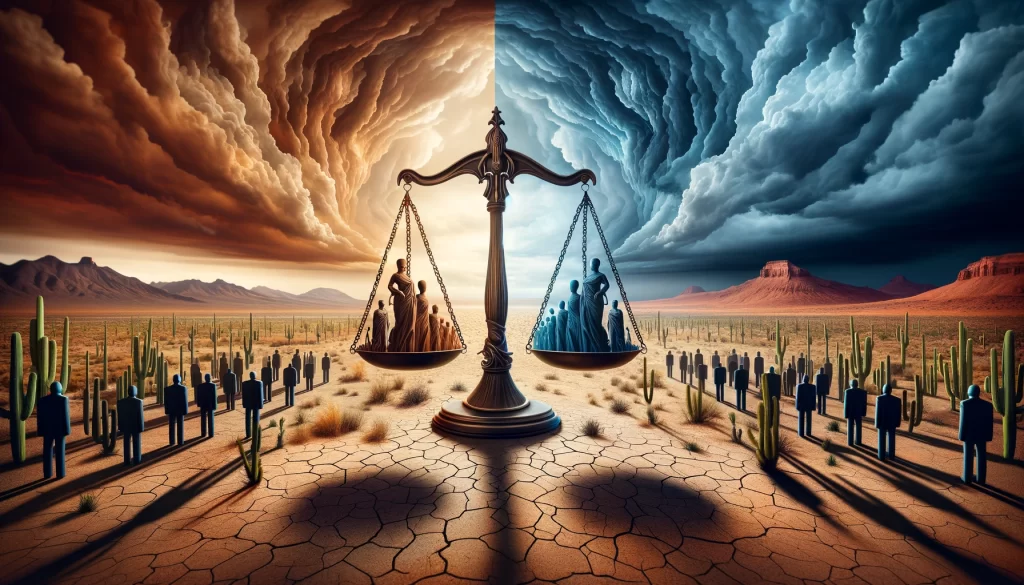In Arizona, a major decision by the state’s supreme court is bringing an old law from 1864 back into the spotlight. This old law, which was created before Arizona was even a state, says that abortions are not allowed except in cases where the mother’s life is at risk. It doesn’t make exceptions for situations like rape or incest and applies to all forms of abortions, including those done with medication.
Previously, Arizona allowed abortions up to 15 weeks into pregnancy. But ever since the U.S. Supreme Court overturned Roe v. Wade nearly two years ago, people in Arizona have been debating whether this old law should come back into action. This law even says doctors could go to jail for two to five years if they help with an abortion.
On April 9, Arizona’s Supreme Court made a decision by a vote of 4-to-2 that the old law can now be used again. They said that since the U.S. Supreme Court no longer protects abortion rights, Arizona doesn’t have anything stopping it from bringing this law back. However, the law isn’t being enforced right away. The court has paused its decision for 14 days and is asking a lower court to look more into whether the law fits with the state’s constitution.

Even with this pause, and an extra 45 days before the law officially starts, it might be a while before anything changes. Abortion clinics expect to keep working as usual at least through May. In addition, Arizona’s Attorney General, Kris Mayes, who disagrees with the decision, said she won’t make doctors face charges for providing abortions. But the future is uncertain as this could lead to more legal battles, especially with those who are against abortion.
This decision might make it harder for clinics in Arizona to offer abortions, causing some women to travel to other states like California, New Mexico, or Colorado if they need one.
Could the old 1864 law banning nearly all abortions in Arizona be changed or even gotten rid of? It’s possible. The judges who agreed with the decision mentioned that such an important issue should be decided by the people of Arizona, either through their elected officials or by voting directly on it.
There’s talk that the state’s lawmakers could remove this old ban, or the people of Arizona could vote to change it this November. This would happen if groups that support the right to choose manage to get enough support to put a new rule in the state’s Constitution that protects abortion rights.
State Senator T.J. Shope, a Republican from an area south of Phoenix, said he wants to get rid of the 1864 ban but keep the rule that allows abortions only up to 15 weeks, a rule the previous governor, Doug Ducey, also a Republican, signed into law. Governor Ducey has said he’s not happy with the court’s decision and believes Arizona’s leaders should create laws that reflect what the people want.
There is also a ballot measure being planned in order to allow abortions up until the point where a fetus could survive outside the womb, which is about 24 weeks, going back to the guidelines that were in place before. The group working on this, Arizona for Abortion Access, needs nearly 400,000 signatures by July to get their proposal on the ballot, and they’ve said they’re already there.

What does this mean for the 2024 elections in Arizona? This decision could play a big role in the upcoming elections. President Biden and other Democrats have pointed fingers at former President Donald J. Trump for making it harder to get abortion care in the U.S. Trump, on the other hand, thinks each state should make its own rules about abortion.
In Arizona, the topic of abortion rights helped Democrats win big positions like governor and attorney general in the 2022 midterm elections. They believe this issue will continue to motivate their voters.
For example, Representative Ruben Gallego, a Democrat running for Senate, has spoken out against the court’s decision, linking it to his opponent, Kari Lake, who previously praised the strict abortion law. Kari Lake, representing a recent change in the Republican approach to abortion, has opposed a nationwide ban but supports the 15-week limit in Arizona. Notably, she has acknowledged that the old law doesn’t match what Arizonans want.
Other Republican leaders facing tough reelection battles in Arizona have also criticized the court’s decision and are calling for it to be addressed by the state’s lawmakers.
Besides Arizona, there are 21 other states with laws that limit abortion earlier than what was allowed under Roe v. Wade.
This article is based on the following article:

Background Information
Understanding these background elements provides a clearer picture of the significance of Arizona’s Supreme Court decision to uphold the 1864 abortion ban and its broader implications for abortion rights and politics in the United States.
1. Abortion Laws in the United States
- Pre-Roe v. Wade Era: Before the 1973 Supreme Court decision in Roe v. Wade, abortion laws varied significantly from state to state. Some states allowed abortion under certain conditions, while others banned it entirely.
- Roe v. Wade (1973): This landmark Supreme Court decision legalized abortion nationwide, establishing that the right to privacy under the Due Process Clause of the 14th Amendment extended to a woman’s decision to have an abortion. The Court also set up a framework based on trimesters of pregnancy, which allowed states to impose restrictions in the later stages of pregnancy.
- Planned Parenthood v. Casey (1992): This case reaffirmed Roe but replaced the trimester framework with the “undue burden” standard, which prevents states from placing restrictions on abortion that impose a substantial obstacle to a woman seeking an abortion before fetal viability.
2. The Role of the Supreme Court
The Supreme Court of the United States has the ultimate authority on interpreting the Constitution, including issues related to abortion rights. Its rulings on landmark cases such as Roe v. Wade and Planned Parenthood v. Casey have shaped abortion law in the United States. Changes in the composition of the Court can lead to shifts in how these laws are interpreted and applied.
3. State vs. Federal Laws
- Federal Laws: These apply to all states and are the supreme law of the land. When the Supreme Court makes a ruling on abortion, it affects every state.
- State Laws: States have the power to regulate abortion but cannot enact laws that are less protective of abortion rights than the federal standard set by the Supreme Court. However, states can and do pass laws that test the limits of these protections, leading to legal challenges that can end up before the Supreme Court.
4. Social and Political Implications of Abortion Debates
- Political Divides: Abortion is a highly polarizing issue, with significant divides often seen between different political parties (e.g., Democrats generally support abortion rights, while Republicans may seek to impose restrictions).
- Impact on Elections: The issue of abortion rights can influence voter turnout and sway elections, particularly in closely contested states.
- Public Opinion: Public opinion on abortion is complex, with many Americans holding nuanced views that favor some level of access to abortion but support certain restrictions.
5. The Overturning of Roe v. Wade and Its Aftermath
If Roe v. Wade were overturned or significantly weakened by a future Supreme Court decision, the regulation of abortion could revert to the states, leading to a patchwork of laws with abortion being highly accessible in some states and heavily restricted or banned in others. This scenario emphasizes the importance of state laws and the power of state courts and legislatures in shaping abortion policy.

Debate/Essay Questions
- Is it ethically defensible for abortion laws to have no exceptions for cases of rape or incest, as is the case with Arizona’s 1864 law?
- How do strict abortion laws disproportionately affect women based on socioeconomic status, race, and geography?
Please subscribe to Insight Fortnight, our biweekly newsletter!
